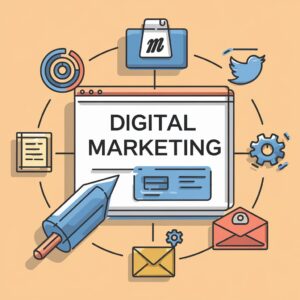Type Of Digital Marketing
Some more Type of Digital Marketing are explained here applying all modes is not possible but they are chosen according to the business and and the targeted customers. Type of Digital Marketing is a limitless topic covering it completely is something which is not possible but we are providing some important topics

Influencer Promotion
To promote your business or products, influencers—people with a sizable and active social media following—are partnered with.
* Influencer Types:
- Mega-Influencers: Well-known people who have millions of followers on social media.
- Macro-Influencers: People in particular niches who frequently have hundreds of thousands of followers.
- Micro-Influencers: People who have tiny but very active fan bases are frequently regarded as more real.
* Advantages: Better brand exposure, access to a specific audience, and increased brand credibility.
2 SEM, or search engine marketing
Search engine marketing (SEM) is a more general word that includes paid search advertising (PPC) and SEO. It entails using paid advertising to promote your website by making it more visible in search engine results.
* Important Platforms: Search engine advertising networks such as Bing Ads and Google Ads.
* Benefits: Measurable influence on website traffic and conversions, fast rise in prominence, and tailored reach.
3. Video Promotion
Using video material to advertise your business, goods, or services on several channels, including YouTube, social media, and your website, is known as video marketing.
* Categories of Visual Media:
- Explainer Videos: Quick films that provide an overview of a good or service.
- Product Demos: Highlighting the attributes and advantages of your offerings.
- Testimonials: Client endorsements that establish credibility and confidence.
- Live streaming: Engaging your audience in real time with broadcasts that are live.
* Advantages: Very captivating, raises conversion rates, strengthens SEO, and appeals to a wide demographic.
4. Mobile Advertising
Using SMS, apps, mobile websites, and social media, you may reach your audience via their smartphones or tablets with mobile marketing.
* Crucial Techniques:
- SMS marketing: Directly sending consumers’ mobile devices commercial or educational texts.
- App-Based Marketing: Advertising in other apps or on your own mobile app to promote your business.
- Location-Based Marketing: Employing Bluetooth or GPS to target consumers according to their precise location.
* Benefits: Targeting consumers who are on the go, instant reach, and high interaction rates.
5. Banner Ads
In order to draw in new users, display advertising entails putting visual advertisements (banners, photos, and videos) on websites, applications, and social media platforms.
* Display Ad Types:
- Banner Ads: Images that are static or move on websites.
- Video Ads: Quick-cut videos that play either before, during, or after other videos.
- Native Ads: Less obtrusive ads that fit in with the platform’s or website’s content.
* Advantages: Broad audience, focused advertising, and attention-grabbing visual appeal.
6. Ad-words
Retargeting is a tactic that involves displaying advertisements to people who have already visited your website or engaged with your content but did not carry out the intended action (such as completing a purchase).
* How It Operates: By adding a tracking pixel to your website, you may watch users while they visit other websites and show them relevant adverts to entice them to come back and make a purchase.
* Advantages: Personalized marketing, higher conversion rates, and lead reacquisition.
07. Web Analytics
Although not a direct marketing strategy, web analytics is an essential component of digital marketing since it collects, measures, and analyzes website data to help guide and improve marketing plans.
* Important Resources: Analytics tools such as Adobe Analytics and Google Analytics.
* Advantages:
Comprehensive understanding of user behavior, evaluation of performance, and data-driven decision-making.
Every type of digital marketing has a distinct function and can be combined with others to form an all-encompassing internet marketing plan. Businesses may effectively contact and engage their target audience, create conversions, and accomplish their marketing objectives by comprehending and utilizing these diverse techniques.

Pingback: Types of digital Marketing or Promotions Part -: 1 - NewDigitus.com